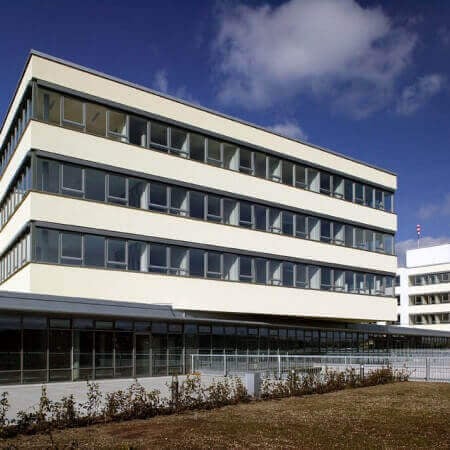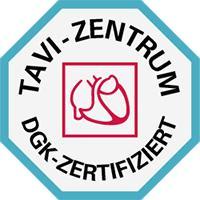The atrioventricular block implies disorder of the flow of electricity between the ventricles and atria of the heart. Typically, the heart rhythm formed in the atrial sinus node travels through the AV node, and then to the ventricles. In AV block, it may not reach the ventricles at all. In such a condition, the ventricles engage in their own rhythm mechanisms, causing the heart to operate at a lower frequency.
Content
- Overview
- Types of AV blocks
- Why does AV block occur?
- Symptoms of AV block
- Complications
- Treatment principles
- Prognosis
- The cost of treatment in a hospital in Germany
- Treatment with Booking Health
Overview
The atrioventricular node (AV node) is the part of the heart's conduction system that provides sequential contraction of the atria and ventricles. The movement of electrical impulses coming from the sinus node slows down in the AV node, allowing the atria to contract and the blood to push into the ventricles. After a short delay, the impulses propagate to the right and left ventricles, contributing to their excitation and contraction. This mechanism ensures alternating contraction of atrial and ventricular myocardium and maintains stable hemodynamics.
The atrioventricular block is based on slow down or complete cessation of pulse passage from atria to ventricles due to AV node lesions. At the same time, the lower the level of the lesion is, the more severe the manifestation of the block is and the more unsatisfactory the prognosis for cardiac disease is.
Types of AV blocks
Depending on the level at which impulse conduction is disturbed, proximal, distal, and combined atrioventricular blocks are distinguished in medicine. In proximal AV blocks, impulse conduction may be impaired at the level of the atria and AV node; in distal AV blocks, bundle branch blocks occur; in combined AV blocks, there are multilevel conduction disorders.
Taking into account the duration of atrioventricular block, there are acute (in case of myocardial infarction, an overdose of drugs, etc.), intermittent (in case of CHD, accompanied by transient coronary insufficiency), and chronic forms. According to the electrocardiographic criteria (delay, periodicity, or complete absence of pulse conduction to the ventricles), there are three degrees of atrioventricular block: 1st degree, 2nd degree, and 3rd degree. The latter indicates a complete cessation of pulse passage from atria to the ventricles. Thus, 1st and 2nd degree atrioventricular blocks are partial (incomplete), and 3rd degree blocks are complete.
The prevalence of atrioventricular block is higher among patients with concomitant cardiac pathology. Among patients with heart disease, first-degree AV block occurs in 5% of cases, second-degree – in 2% of cases, third-degree AV block usually develops in patients over 70 years old. According to medical statistics, sudden cardiac death occurs in 17% of patients with complete AV block.
Why does AV block occur?
Functional and cardiac atrioventricular blocks are distinguished according to their etiology.
The functional AV block is caused by increased tone of the parasympathetic nervous system. Both first- and second-degree atrioventricular blocks are occasionally observed in young, physically healthy individuals, trained athletes, for instance. The patients usually experience the manifestation of heart disease during sleep, and it disappears during physical activity, which is explained by increased activity of the vagus nerve and is considered as a variant of the norm.
The AV block of cardiac genesis develops as a result of idiopathic fibrosis and sclerosis of the cardiac conduction system in various heart diseases. The causes of cardiac AV block may include rheumatic processes in the myocardium, cardiosclerosis, cardiovascular syphilis, interventricular septal infarction, heart defects, cardiomyopathies, myxedema, diffuse connective tissue diseases, myocarditis of different genesis, amyloidosis, sarcoidosis, hemochromatosis, tumors, etc. With cardiac AV block, partial block may be observed at first, but as the disease progresses, third-degree block develops.
Various surgical procedures can lead to the development of atrioventricular blocks, including aortic valve replacement, plastic repair for the treatment of congenital heart disease, atrioventricular RFA of the heart, right heart catheterization, etc.
The patients with the congenital form of the atrioventricular block are quite a rare phenomenon in medicine. For patients with congenital AV block, there is a lack of conduction between atria and AV node, and between AV node and ventricles, with the development of a corresponding level of block. In a quarter of newborns, the atrioventricular block is combined with other congenital cardiac abnormalities.
Among the causes of atrioventricular blocks often occurs intoxication with the following drugs: cardiac glycosides (digitalis), β-blockers, calcium channel blockers, antiarrhythmic drugs (quinidine), lithium, some other drugs, and their combinations.
Symptoms of AV block
The symptoms of AV block depend on the rate of ventricular contractions of the heart and the degree of damage to the heart muscle.
The AV block with delayed pulse transmission is asymptomatic and is often detected by electrocardiography. Emerging complaints of patients are associated with the underlying diseases due to which the block developed. These may be peptic ulcer disease, elevated intracranial pressure, hypertension, coronary heart disease, etc.
With partial AV block, the symptoms patients experience depend on the frequency of ventricular contractions. In case of large pauses occurring during every second or third ventricular contraction, especially in atherosclerosis, signs of insufficient blood supply to the brain may appear, including dizziness, weakness, or sudden episodic fainting. Patients are usually unconscious for several minutes, before which the skin turns sharply pale and red afterward. The symptoms of congestive heart failure may also occur (shortness of breath, swelling of the legs, a sharp decrease in the tolerance of physical activity).
With complete block, patients' complaints are most pronounced. In the case of congenital AV block, the patient may have the feeling of cardiac arrest, weakness, fatigue, especially after physical exertion, headaches, dizziness, or fainting. Increased pulsation in the head and neck area is also typical in such patients. A feeling of heaviness and pain in the heart area, dyspnea, and other manifestations of heart failure may be typical for patients with AV block.
Complications
Complications of atrioventricular blocks are mainly due to a pronounced slowing of the rhythm, developing along with heart damage. Most often, the course of AV block is accompanied by the appearance or worsening of chronic heart failure and the development of ectopic arrhythmias, including ventricular tachycardia.
The course of complete atrioventricular block may be complicated by the development of Stokes-Adams attacks associated with cerebral hypoxia resulting from bradycardia. The onset of an attack may be preceded by a sensation of heat in the head, attacks of weakness, and dizziness. During such attacks, the patient becomes pale, then cyanosis and loss of consciousness develop. At this point, patients may require indirect heart massage and ventricular ventilation, as prolonged asystole or ventricular arrhythmias increase the likelihood of sudden cardiac death.
Repeated episodes of fainting in elderly patients can lead to the development or aggravation of intellectual and mental disorders. Less often AV block can cause the development of arrhythmogenic cardiogenic shock (it is more likely for patients with myocardial infarction).
Under conditions of insufficient blood supply in AV block, sometimes the phenomena of cardiovascular failure (collapse, syncope), exacerbation of coronary heart disease, and kidney disease are observed.
Treatment principles
The atrioventricular block is not an independent disease, but a pathology occurring due to other heart diseases. Therefore, it is very important to diagnose and treat the underlying disease.
When the diagnosis of AV block is made, treatment in Germany is chosen holistically, which takes into account different aspects of the heart functioning and leads to improvement of the cardiovascular system.
With that said, the following treatment methods may be prescribed:
- Drug therapy.
- Resynchronization therapy.
- Stenting.
- Coronary artery bypass grafting.
If a first-degree atrioventricular block occurs without clinical manifestations, only dynamic monitoring is possible. If AV block is caused by taking medications (cardiac glycosides, antiarrhythmic drugs, β-blockers), it is necessary to make dose adjustments or their complete withdrawal. With AV block of cardiac genesis (in myocardial infarction, myocarditis, cardiosclerosis, etc.) a course of treatment with β-adrenostimulants (isoprenaline, orciprenaline) is conducted, with further pacemaker implantation.
First aid drugs for stopping Stokes-Adams attacks are isoprenaline (sublingually) and atropine (intravenously or subcutaneously). In phenomena of congestive heart failure, diuretics, cardiac glycosides, and vasodilators are prescribed. As symptomatic therapy in chronic AV block treatment with theophylline, belladonna extract, and nifedipine is applied.
If there is a complete left bundle branch block and heart failure diagnosed, resynchronization therapy (pacemaker implantation) is performed. Pacemaker implantation is a radical method of AV block treatment, which restores a normal rhythm and heart rate. The indications for endocardial pacemaker implantation are a history of Stokes-Adams attacks (including the history of a single episode), ventricular rhythm less than 40 per minute and periods of asystole of 3 seconds or more, second-grade or third-grade AV block, complete block with angina pectoris, underlying congestive heart failure, and arterial hypertension, etc.
The effectiveness of treatment depends largely on the degree of myocardial conduction system damage, as well as on the correctness of the chosen treatment.
Prognosis
The impact of the developed atrioventricular block on the further life and working ability of a patient is determined by several factors and, first of all, by the level and degree of the block, and the number and severity of underlying diseases.
As a rule, the atrioventricular block is caused by the underlying disease or pathological condition, so its prevention is the elimination of etiological factors. To prevent the aggravation of AV block, the pacemaker implantation is indicated.
The prognosis is the most unfavorable in the third-degree atrioventricular block; patients with such a pathology have pronounced symptoms of heart failure and usually are unable to work.
The prognosis is complicated by the development of distal AV blocks due to the threat of complete block and impaired ventricular rhythm, as well as their occurrence due to acute myocardial infarction. An early implantation of a pacemaker allows to increase the life expectancy for patients with atrioventricular blocks and to improve their quality of life. Complete congenital AV block is prognostically more favorable than acquired one.
The cost of treatment in a hospital in Germany
If you are diagnosed with atrioventricular block, you can receive treatment in Germany at the best cardiology hospitals. At the hospital in Germany, you can get the necessary heart diagnostics, consult with the leading German cardiologists and undergo the necessary treatment. The diagnostic procedures or cardiac surgery of any complexity can be performed in the best cardiology hospitals in Germany. The cost of treatment in Germany is quite moderate and reasonable:
- The prices for AV block diagnostics start at 496 EUR.
- The cost of treatment with conservative therapy starts at 1,489 EUR. (diagnostics included).
- The cost of treatment with pacemaker implantation starts at 3,885 EUR.
- The prices for cardiac rehabilitation start at 566 EUR.
You can get a free consultation regarding the prices for treatment in the hospital in Germany by contacting Booking Health.
Treatment with Booking Health
Booking Health offers the widest possible range of services related to the treatment in Germany. We cooperate with hospitals in Germany that specialize in various areas of medicine, including cardiology.
Besides, treatment in Germany is available not only for adults but also for children, with all age-related peculiarities taken into account.
All you need to do to start your treatment of atrioventricular block in Germany is fill in the request form on the Booking Health website, and our medical advisor will contact you promptly.
Authors:
This article was edited by medical experts, board-certified doctors Dr. Nadezhda Ivanisova, and Dr. Bohdan Mykhalniuk. For the treatment of the conditions referred to in the article, you must consult a doctor; the information in the article is not intended for self-medication!
Our editorial policy, which details our commitment to accuracy and transparency, is available here. Click this link to review our policies.




















